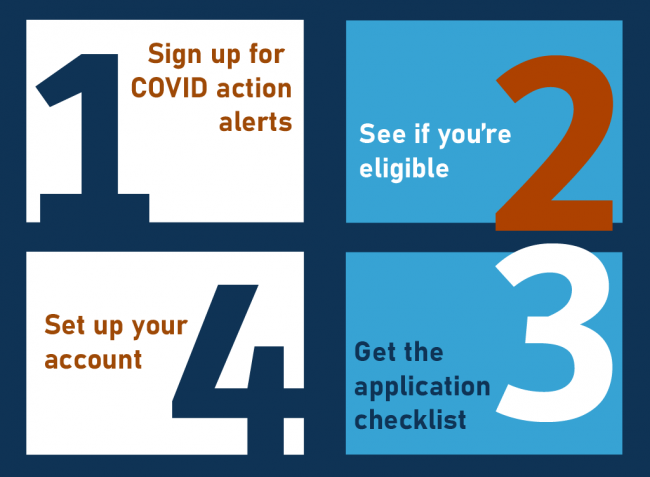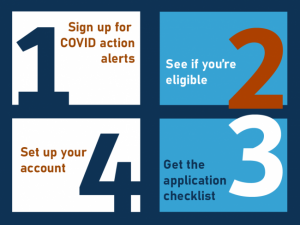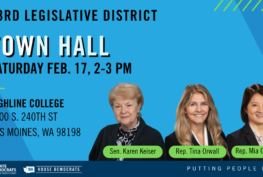Dear Neighbors,
This pandemic has brought tough times for all of us—most especially those who have lost loved ones. At the same time, many people are suffering from its indirect economic effects. That’s why I see it as my job to pass on to you information that can help you use the benefits that our state provides, as well as listen to your concerns and help you address them.
I am so sorry that our Employment Security Department was overwhelmed with the tens of thousands of claims that have been filed over the last few weeks. They are catching up on thousands of complicated claims, and have cut the backlog in half. Please know that the unemployment insurance trust fund remains solvent, so the benefits will be paid eventually. I know many of you are struggling while waiting for your benefits.
You can always contact my office using the information at the bottom of this email. Here are some updates on benefits that may help you or someone you know.
Unemployment Insurance
Here’s some information from the Employment Security Department to help obtain the full benefits you are eligible for.
- File your claims every week. Many people who are eligible and qualify for benefits haven’t filed weekly claims. If you’ve already applied for unemployment benefits but have not yet filed a weekly claim, be sure to file your weekly claim and check this information first before doing so.
- Apply for expanded benefits. If you applied for regular benefits but were ineligible, you may still be eligible for the new expanded benefit called Pandemic Unemployment Assistance (PUA). Check out this guide before you apply.
- Answer the phone. The Employment Security Department (ESD) team members are reaching out and calling people to resolve their cases.
- Check your spam filter for emails and check your e-services account for notes from ESD asking for information.
- If you’re new to making a claim, these prep materials may help.
- If you refused an offer of work, you need to state why. While it’s possible you’ll no longer be eligible for benefits, you may still be eligible if you still have a COVID-19 reason why you are unable to go into the workplace, such as kids home from a school that’s closed due to COVID-19, or a COVID-19-vulnerable member of your household. Here’s more.
- Rest assured: the money will not run out and benefits will be paid retroactive to the date of eligibility. Even if you return to work, you’ll be able to receive benefits for the weeks for which you were eligible.
At this point, 810,000 people (or one of every five working Washingtonians) have applied for unemployment benefits since the start of this crisis. Of those, two thirds have received payments, but there are 57,000 people still waiting for their claims to be adjudicated.
If you’ve applied and your claim is in adjudication, ESD has launched Operation 100% to process the claims in the adjudication queue. Here’s their webpage with more information.
Imposter Fraud: If your identity has been compromised in the last few years through one of the huge data breaches at various corporations, it’s possible that your name and data could be used for a fraudulent unemployment insurance claim. If you suspect this has happened to you, this page on ESD’s site has the information you need to report it.
Workers’ compensation
- Many people are asking whether exposure to COVID-19 on the job is grounds for a workers’ compensation claim. Under certain circumstances, claims by health care providers and first responders may be allowed. Some other claims that meet certain criteria for exposure will be considered on a case-by-case basis.
- To file a claim, go to the Department of Labor & Industries’ FileFast tool, call 1-877-561-3453 (FILE), or talk to your doctor.
- If you already have a claim but are hindered from following through on appointments or other elements by COVID-19, see the answers to more questions here.
Worker safety
- Employers must ensure social distancing for employees and customers, as well as providing for frequent and adequate employee hand-washing.
- Sick employees must be allowed to stay home.
- Employers must also provide basic workplace hazard education about the coronavirus and how to prevent transmission — in languages best understood by employees.
- Industry-specific rules are online on the LNI website
Safe Start phased reopening
The Governor’s Stay Home, Stay Healthy order has been extended through May 31. And he has introduced a phased reopening plan to chart a careful path to reopening that balances our public health with our economic health. We are all hoping that this plan will not result in a huge increase in deaths or illnesses from COVID-19. It’s important to maintain strict discipline and standards during this awful pandemic. I consider it to be something like a war, and our public health standards are our first defense. We are all in this together!
If you’d like to follow what I’m working on, you can like my official legislative Facebook page here.
Please don’t hesitate to stay in touch.
Always,
Senator Karen Keiser
Chair, Senate Labor & Commerce Committee
Senate President Pro Tempore






